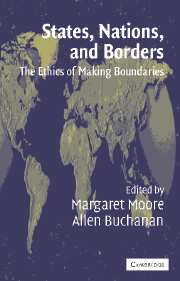Book contents
- Frontmatter
- Contents
- About the Contributors
- Acknowledgments
- 1 Introduction: The Making and Unmaking of Boundaries
- THE JEWISH TRADITION
- THE CONFUCIAN TRADITION
- THE CHRISTIAN TRADITION
- THE NATURAL LAW TRADITION
- 8 The Making and Unmaking of Boundaries from the Natural Law Perspective
- 9 Natural Law and the Re-making of Boundaries
- THE ISLAMIC TRADITION
- THE LIBERAL TRADITION
- THE INTERNATIONAL LAW TRADITION
- CONCLUSION
- Index
9 - Natural Law and the Re-making of Boundaries
Published online by Cambridge University Press: 24 November 2009
- Frontmatter
- Contents
- About the Contributors
- Acknowledgments
- 1 Introduction: The Making and Unmaking of Boundaries
- THE JEWISH TRADITION
- THE CONFUCIAN TRADITION
- THE CHRISTIAN TRADITION
- THE NATURAL LAW TRADITION
- 8 The Making and Unmaking of Boundaries from the Natural Law Perspective
- 9 Natural Law and the Re-making of Boundaries
- THE ISLAMIC TRADITION
- THE LIBERAL TRADITION
- THE INTERNATIONAL LAW TRADITION
- CONCLUSION
- Index
Summary
Introduction
When I taught law in the University of Malawi between 1976 and 1978, I lived in houses owned by the university in succession to the government, houses formerly occupied by colonial civil servants. From my first house in Zomba, I looked over the roof of the adjacent Parliament House, across the trees hiding the university down on the plain, and on towards the mountains of Mozambique, an even more newly independent country. At night we could see, out on the plain beyond the university, the arc lights around the prison camp where several hundred prisoners were detained on Presidential orders, including the most recent holders of the offices of Registrar of the University and Principal of the university college of which the Law Faculty was part. The President's powers of detention without trial were copied from powers used sometimes by the British government of the Nyasaland Protectorate. That protectorate, or colonial administration of the territory, had been inaugurated partially and informally in 1884, formally but partially in 1889 and formally and entirely in 1891, and terminated formally in 1964 (in substance in February 1963).
The Nyasaland protectorate was inaugurated against the long-standing wishes of the Foreign and Colonial Offices of the British Government, under pressure of public opinion keen to prevent the humanitarian disaster of an immense and long-standing slave trade conducted by Arabs with the willing assistance of the tribe that dominated the southern and south-eastern shores of Lake Nyasa and preyed on peaceable but loosely organized Nyanja peoples just as the Angoni, pushed back from southern Africa by the Zulu, annually pillaged and slaughtered the Maravi on the western and northern shores of the lake.
- Type
- Chapter
- Information
- States, Nations and BordersThe Ethics of Making Boundaries, pp. 171 - 178Publisher: Cambridge University PressPrint publication year: 2003

